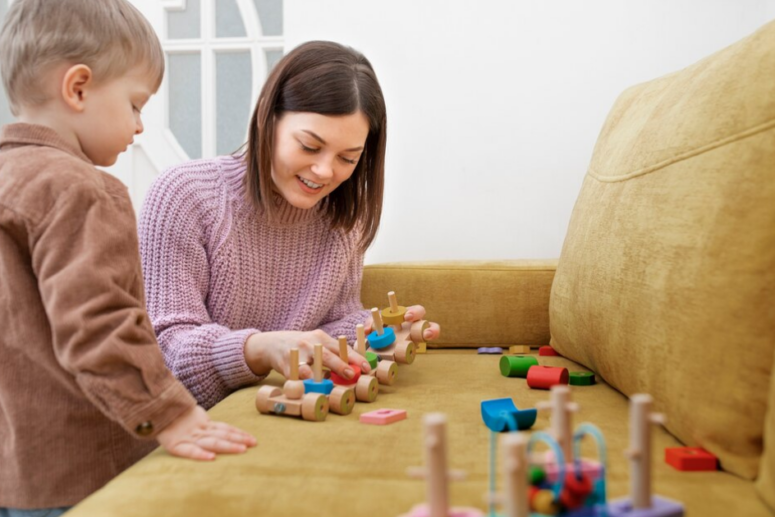
Table of Contents
When parents begin to explore therapy options for their child with autism, one of the first decisions they face is whether to pursue clinic-based therapy or in-home therapy. Both types of therapy have distinct advantages, and each family’s circumstances will influence which option is best suited to their child’s needs. In Florida, a variety of professionals offer both clinic-based and in-home therapy services, and understanding the differences between these approaches is key to making an informed decision.
In this article, we will compare clinic-based therapy and in-home therapy, outlining the benefits, challenges, and practical considerations associated with each approach. By the end of this discussion, you’ll have a clearer picture of what each option entails and how to determine the best course of action for your child.
Understanding Clinic-Based Therapy
Clinic-based therapy involves therapy sessions that take place at a specialized clinic, typically staffed by a team of professionals trained in various therapeutic techniques. In Florida, these clinics often provide structured environments where children can engage in therapy with minimal distractions.
Benefits of Clinic-Based Therapy
- Access to Specialized Resources and Equipment Clinic-based therapy settings are typically equipped with a range of resources and equipment designed to facilitate a variety of therapeutic interventions. These include sensory rooms, specialized learning tools, and other aids that may not be available in a home environment. The abundance of resources can be particularly beneficial for children who require specific sensory input or therapeutic modalities.
- Structured Environment One of the most significant advantages of clinic-based therapy is the highly structured environment. The setting is often designed to minimize distractions, helping children focus better on their therapy. With fewer household interruptions, children may find it easier to concentrate and engage in their therapeutic activities.
- Opportunities for Social Interaction In clinic-based therapy, children have the opportunity to interact with other children and adults in a controlled environment. This can be especially beneficial for developing social skills, as children often learn how to engage with peers in a therapeutic setting. Group sessions may also be available, providing more opportunities for socialization.
- Multi-Disciplinary Team Approach Clinics often have a variety of specialists on staff, including Board Certified Behavior Analysts (BCBAs), speech therapists, occupational therapists, and psychologists. This allows for a more holistic approach to therapy, with different professionals working together to address all aspects of a child’s development.
Challenges of Clinic-Based Therapy
- Logistical Challenges One of the primary challenges of clinic-based therapy is the need to travel to the clinic, which may not always be conveniently located. Depending on the distance, this could create time and financial burdens for families. Additionally, if the clinic’s schedule doesn’t align with the child’s natural rhythm or family schedule, it may be harder to maintain consistency.
- Less Flexibility in the Environment While the structured environment can be beneficial, it may also limit a child’s ability to practice skills in a more natural, everyday setting. Some skills, such as communication and behavior management, may require the context of home, school, or the community to generalize effectively.
- Limited Focus on Home Environment Clinic-based therapy often focuses on improving skills within the context of the therapy room but may not address how those skills translate into real-life situations at home. For children with autism, it’s important to practice and reinforce these skills in their natural environment to ensure long-term success.

Understanding In-Home Therapy
In-home therapy involves therapists coming to your home to provide direct services to your child. This approach can offer a more personalized experience and allows therapy to occur in a familiar environment.
Benefits of In-Home Therapy
- Comfortable and Familiar Setting Many children with autism feel more comfortable and secure in their home environment, which can help reduce anxiety and improve engagement during therapy. When therapy occurs at home, children may feel less stressed and more open to trying new things.
- Natural Environment for Skill Application In-home therapy provides the opportunity for children to practice skills in real-life settings. Whether it’s learning how to ask for help, follow routines, or interact with family members, practicing skills at home ensures they can be applied in everyday situations. This also helps with generalization, as children see how therapy is relevant to their daily lives.
- Family Involvement In-home therapy allows families to be more involved in the process. Parents can observe therapy sessions, ask questions, and learn techniques to reinforce at home. This increased involvement can lead to greater consistency and support for the child, both during and outside of therapy hours.
- Personalized Approach In-home therapy is often tailored specifically to the child’s needs, as therapists can design sessions around the home environment and incorporate real-life experiences. Additionally, the therapist may work closely with family members to ensure that interventions are aligned with the child’s daily routines.
Challenges of In-Home Therapy
- Potential for Distractions While a child may be comfortable in their home, the home environment may also present distractions that could interfere with the effectiveness of therapy. Siblings, pets, household chores, and other elements of daily life can disrupt the focus of the child during sessions.
- Limited Access to Specialized Equipment Unlike clinics, home environments may not be equipped with the specialized equipment that may enhance therapy. For certain types of therapy, such as sensory integration therapy, a clinic’s specialized resources may be more beneficial.
- Less Social Interaction with Peers In-home therapy may not offer as many opportunities for children to interact with peers. Socialization is often a critical component of therapy, and some children may miss out on the chance to engage in group activities or develop social skills in a more structured setting with other children.
- Dependence on Family Support In-home therapy may require more active participation from the family to reinforce the lessons and strategies learned during sessions. For some families, this could be time-consuming and may place additional responsibilities on parents, especially if they are balancing therapy with other work or caregiving duties.

Key Considerations When Choosing Between Clinic-Based and In-Home Therapy
Child’s Specific Needs
The choice between clinic-based and in-home therapy largely depends on the child’s specific needs. If the child requires specialized resources or benefits from a structured environment, clinic-based therapy may be the better option. On the other hand, if a child thrives in a familiar, home setting and needs practice in real-life situations, in-home therapy may be a better fit.
Family Schedule and Availability
In-home therapy can offer more flexibility for families who may have difficulty adhering to a clinic schedule or traveling long distances. However, the availability of therapists for in-home sessions can vary, and some families may prefer the more fixed schedule that comes with clinic-based therapy.
Socialization Opportunities
Social skills development is a major component of therapy for many children with autism. If social interaction with peers is an important goal for your child, clinic-based therapy may provide more opportunities for this kind of engagement. However, some in-home therapy programs include group sessions or incorporate community outings for socialization.
Financial Considerations
Financial factors are also an important consideration. While both in-home and clinic-based therapies may be covered by insurance, the cost can vary depending on location, frequency of sessions, and the specific services offered. It’s important for families to review their insurance policies and consult with providers about coverage options before making a decision.
Hybrid Approaches
Many families in Florida find that a combination of both clinic-based and in-home therapy works best for their child. For example, children may attend clinic-based sessions for specific therapeutic techniques and also receive in-home therapy to reinforce skills in their natural environment. This hybrid approach can offer the best of both worlds, providing the structure and resources of clinic-based therapy while maintaining the comfort and relevance of in-home services.
Choosing between clinic-based therapy and in-home therapy for your child is a personal decision that should be based on your child’s individual needs, your family’s schedule, and your long-term goals for therapy. Both options offer distinct benefits and challenges, and what works for one child may not be the best fit for another.
Ultimately, it is essential to assess your child’s specific needs and consult with therapy providers in Florida to determine which option will provide the most effective support. Whether you choose clinic-based therapy, in-home therapy, or a combination of both, the right approach will help your child develop essential skills and improve their overall quality of life.

Reach Out Today for Expert ABA Therapy Services
If you’re looking for high-quality ABA therapy in Florida, Behavioral Intervention For Autism is here to help. Our experienced team is dedicated to providing personalized care that meets the unique needs of each individual. Whether you’re seeking early intervention or support for ongoing development, we offer a comprehensive approach that promotes progress and enhances life skills. Don’t wait—contact us today to learn more about how our tailored ABA therapy can make a lasting difference in the lives of those with autism.
- 9 Common Obsessions of Children With Autism You Should Know - February 25, 2025
- What is Neurodiversity? A Guide to Embracing Differences - February 25, 2025
- Understanding Hyperfocus in Autism: What It Means and Why It Happens - February 25, 2025
